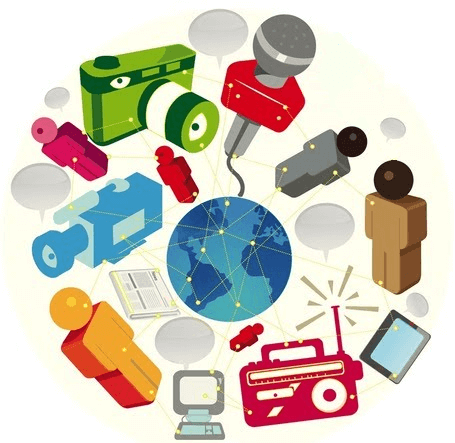Advantages and Disadvantages of Mass- CommunicationWhat Is Mass Communication?Throughout history, the practice of disseminating knowledge to a specific person or group of individuals has greatly evolved. People can obtain important information relevant to their everyday lives through channels of communication like the newspaper, radio or television broadcasts, and social media. Since most people utilize mass communication daily, it is crucial to comprehend the notion. The act of conveying a message to a sizable number of anonymous and diverse individuals and organizations over a communication channel is referred to as mass communication. The general public or a portion of the general public is one of these sizable groupings. Most frequently, a professional representative who speaks on behalf of an organization is the message's sender. 
A branch of communication studies, mass communication is a subject of study in the social sciences. Most mass communication is one-way, implying that the recipient cannot reply or give feedback to the sender. It is a costly procedure between the sender and the receiver that is frequently delayed and indirect. Mass Communication ExamplesMost media outlets use mass communication. There are many ways to watch mass media, and there are many job options in this study area. For instance, most people who work in the mass communication sector also participate in its analysis and study. Mass communication studies involve various professions, including news media directors and photographers, filmmakers, writers, online producers, content developers, public relations officers, and researchers. The public's perception of a service or an organization can be influenced by several sectors, which can also foster attitudes via advertising. Newspapers were the first mass medium made possible by the printing press's creation. Mass communication has advanced over time thanks to the radio, television, Internet, and new social media platforms. News shows, TV, and political advertisements are all examples of mass communication. Just a few examples of media platforms where mass communication is demonstrated include the following:
The following is a list of prospective media and Mass communication occupations that someone with a degree in the area might be able to pursue. A Career in Mass CommunicationA mass communication bachelor's or master's degree can open up many job options in industries, including journalism, public relations, healthcare, social and digital media, non-profits, consultancy, financial services, and more. Public relations agencies, marketing and advertising companies, newspapers and digital publishers, community and non-profit groups, healthcare agencies and hospitals, television and radio stations, and more are possible career paths for graduates of mass communication studies. Professionals with a background in mass communications are essential for delivering focused, impactful messages to broad audiences because they understand audience behavior and content production. Graduates of master's programs in the discipline may also pursue doctorate degrees and positions in academia and research. News Media Director: News media directors oversee the work of teams of reporters who produce news articles. They develop editorial calendars to address interesting subjects and supervise the creation of educational material about social, political, cultural, and economic issues. They have an awareness of their readership and audience. Journalists: Research and write about or report on important events or subjects to their audience while working under the direction of news media directors. They create stories that entertain readers while teaching them using not just the written word but also multimedia and interactive technologies. Journalists sometimes specialize in certain news media fields, such as politics, health, economics, or social concerns. Web Content Professionals: Web content professionals and producers are experts at creating interesting and educational information for online audiences. Web content specialists include social media specialists, search engine optimization (SEO), directors, and web producers. They often oversee one or more websites or online assets (such as social media pages) and create and carry out content strategies that cater to the interests of their target readerships. These experts evaluate the performance of their website in terms of reader engagement and online traffic using software that analyses web traffic and search engine data. They also regularly change the content of their websites to keep them relevant for their target audiences. Public Relations Director: Public relations directors oversee creation and implementation of strategic communication plans that improve an organization's or company's public image and foster goodwill among customers, rivals, investors, and the media. They often oversee the creation of media techniques consistent with the organization's goals and values and manage a team of public relations personnel. Marketing Director: Marketing directors oversee the development of multimedia advertising and other marketing materials that build customer engagement, promote a brand, and increase sales of goods and services. These experts also employ customer relationship management software and marketing and consumer behavior analytics technologies like search engine marketing analytics technology to inform their marketing tactics. 
Marketing Specialist: Marketing experts carry out marketing and advertising initiatives under the direction of marketing directors. Marketing directors may create the concept for a new marketing plan. Still, specialists carry out these plans by writing pertinent and interesting content, making videos and graphics that draw viewers in, and regularly conducting consumer research to ensure their current marketing strategies align with the newest technologies and customer preferences. Advantages of Mass CommunicationThe ability to communicate with larger audiences is mass communication's main advantage. Here are some additional advantages: 1. Worldwide communication Mass communication has improved our ability to keep in touch with one another. Since we have access to international communication, raising public awareness is possible. This is especially encouraging news for raising public understanding of environmental and health issues. It offers a platform through which people can educate themselves and take positive action, improving the world. Additionally, it enables others to send assistance in times of need. 2. Entertainment Entertainment is one of the most well-liked uses of mass communication. Society has always included entertainment, and a larger audience prefers amusement over facts. This group includes young people, teens, sports enthusiasts, and children (cartoons). The ability to reach audiences worldwide has allowed performers to use sound records, cinema, radio, and television. 3. It Can Give the Voiceless a Voice Mass media may elevate a unique voice that would otherwise go unnoticed, from reporters telling us about individuals in tough situations to social media that allows one person's opinions to go viral and travel worldwide. 4. Freedom of Speech Not everyone was able to share their ideas and beliefs at one point in time. Even if they were, they lacked the tools necessary to act, but such times are no longer here. Everyone may now freely express themselves thanks to mass communication, which gives them a voice. People don't have to go out of their way to support what they believe since it is readily available. They can use social and digital media, where millions and billions of people will hear what they have to say. 5. Universality This describes how widespread a medium is and how well-liked messages are. Before listening to a radio broadcast or watching a television show in a native language, a person does not need to be literate or educated. 6. Permanence This is when a medium may retain a message, making it reviewable. Books, newspapers, and magazines can all be read again and kept for a long time by readers. 7. Interpretation Mass media's role in interpretation is to put new information in perspective and analyze its import and importance. Newspapers have traditionally offered this interpretation in their editorial and opinion sections, reserving the news pages for material that was meant to be unbiased. 8. Commercial Communication Businesses must be able to attract new clients and keep their current clientele to succeed. What could be a more effective strategy to do this than mass communication? With marketing and advertising, consumers would be aware of the presence of different brands, making it easier for them to conduct business. Building a solid consumer base has gotten simpler thanks to business communication. 
9. Informational Network The Internet covers everything from basic search functions to learning classes. Anyone can learn anything they are interested in through social media, and knowledge is abundant. It makes it simple to duplicate material electronically, making mass teaching conceivable. Additionally, it saves significant money that would otherwise be required to generate information. People can utilize mass media for amusement as well as for educational objectives. 10. Encourages Diversity Diversity is inevitable because mass media allows for global communication. You may have heard of or seen TV and radio shows that focus on the world's many cultures. It encourages variety and disseminates information about different forms of art and culture. Seeing the globe from various vantage points may be a terrific educational experience. Furthermore, you may visit the entire world without ever leaving your home. Something new is revealed about various groups' cultural customs and beliefs every time you look at it. 11. Establishing a Business and Introducing New Item Mass media spreads awareness about creating and launching a business and introducing new products for the organization. 12. Cultural Transmission or Exchange The passing on or transferring of a society's (or a nation's) social ideals and traditions from one generation to another is called cultural transmission or exchange. To promote and even integrate culture, cultural transmission functions as preserving previous legacy culture from one ethnic group to another, from one nation to another, and from generation to generation. The greatest opportunity for socialization exists in television and cinema because of how realistic they appear. 13. Contact with Families and Friends Thanks to mass communication, many individuals may get in touch with relatives or friends of their heirs. People travel all over the world. Thus they require a reliable method to maintain communication with their family back home. According to research, almost 95% of people communicate through electronic devices, such as mobile phones, landlines, computers, etc. Disadvantages of Mass CommunicationYou may have heard that wealthy people control the media. It is undoubtedly partially true, which makes it a drawback of mass communication. Here are some other negatives: 1. Untrustworthy News It would be best only to trust half of what you see and none of what you hear. However, most mainstream media focuses on what we see and hear. Powerful individuals may utilize it to convince the public to believe what they want by showing them what they want. Furthermore, news that isn't trustworthy might have negative effects. Misinformation can be used to manipulate people because it is simple to spread through the media. These rumors spread among the populace and fostered animosity. 2. Empower the Already Powerful Although the media may provide a platform for everyone to tell their narrative, most of our mass media is bought. Also, since it was paid for, individuals with money have a big say in what we see and hear. Due to this, the wealthy and those connected to the wealthy have a far louder voice than most of us. To put it mildly, it's a means for a small minority to maintain control over the vast majority. This is not appropriate in its perfect form. 3. Health Issues It can result in physical health problems in addition to altering people's thoughts through the use of media. The news and information can occasionally become so compelling that people watch them nonstop daily, and this leads to issues with hearing and vision. You know how unproductive you feel at the end of the day if you have ever encountered this. Knowing that you lost time and watched undesired information because you were preoccupied makes the situation worse. 4. Used for Spreading Misinformation and Hatred How can you be sure that what you read or hear in the media is reliable? While it is true that some sources of information are more reliable than others, mass media, in general, lacks protection against deliberate publicity and its lies. Since over a century ago, extremist systems have used the media to influence what their kin accept. Since the Internet has grown in popularity, even those who live in systems where the majority dominates can easily be exposed to material that aims to make us hate or believe lies. 5. It May Advocate Incorrect Values The possibility of the mass media endorsing the incorrect qualities is one of its biggest downsides. How frequently do you see material that encourages drug use, smoking, and other themes that are censored? Despite harming public health, they are glamorized and promoted by the media. Additionally, they display dangerous maneuvers that, when attempted by individuals, might injure the performers. Furthermore, certain media content is unsuitable for youngsters. Another issue that results from this is that it might be difficult to manually restrict their access to this kind of stuff. 
6. A Breach of Privacy It isn't easy to understand how the media and the protection of personal information relating to one another. Numerous data breach cases have made individuals consider how their privacy may have been violated. Mass media reaches a vast audience, leaving millions open to data exploitation. Companies are held accountable, and stricter restrictions are implemented to address these privacy concerns. However, this is insufficient, and people should exercise caution when sharing anything on social media. 7. Homogenize Culture Before the advent of mass media, handicrafts and culture were more restricted, reflecting variations in how people interacted, communicated, and dressed. Currently, comparable societal repercussions are frequently seen and heard around the world. Variation still exists, but mass media may lessen social variety, depriving us of artistry and purpose. 8. The Decline in the Country's Productivity The decline in national productivity is a result of the mass media. Some shows are so captivating and lengthy that viewers can spend valuable time binge-watching them instead of getting work done. One illustration is the soap opera people watch for at least an hour daily. This one hour might be put to good use or toward other worthwhile tasks, but that is only sometimes the case. Televisions being installed in offices are becoming commonplace. This might prevent employees from performing at their best. 9. Hacking The fact is that while the media may be utilized to disseminate knowledge, it can also be readily abused. The incidence of hacking has grown recently. Social media sites are frequently breached. Additionally, business accounts are hacked alongside those of individuals, resulting in enormous losses. Cybercriminals exploit the personal information consumers disclose online and use it against them. Therefore, even if media enables mass communication, individuals' intentions are only sometimes sincere. 10. Does not Represent the Opinions of the People in General One of the finest instruments for gauging the public's thoughts on a particular problem at a given moment has been hailed as the mass media. This might only sometimes be the case, though. There are instances where public opinion differs from that expressed in the media. The opinions of the public can occasionally govern the media. These controllers might be businesspeople or politicians who wish to decide how a public problem will be handled. Such individuals can slant public discourse in the direction of their narrow interests. Therefore, what is presented as the public's opinion is often the opinion of a small group. 11. Give Booze and Drugs a Guise of Legitimacy Some television networks and their programming promote drug and alcohol use as normal behavior. This gives the impression that using these items is ok for everyone, while doing so might harm customers' health. 12. Overtake Personal Connections We've all gone to dinner parties where everyone spends a significant portion of the evening staring at their phones or a TV in the corner. Even if the media may connect us to people worldwide, it can separate us from those standing before us. 13. Inappropriate Material for Children Another drawback of mass media is that some of the material broadcast for general consumption is inappropriate for young people. This becomes challenging for parents who might only sometimes be at home or who don't have other people to watch the kids. Some precautions have been taken to restrict children's access to such adult content. Still, occasionally the restrictions can be violated because kids sometimes seem to be a little trickier than their parents. 14. It Might Not be Available to Everyone Another drawback of mass media is that not everyone can access it. For instance, newspapers must continue to sell copies to be profitable. For this reason, the media firm can discontinue distributing its publications in areas with very low sales. In other words, newspapers only publish in certain areas. People may only listen to television and radio stations where the signals are present. Because of technical limitations, even if the mass media is meant to be accessible to everyone, this may not always be the case. 15. There are Situations When People are Not Who They Say They Are On the Internet, anyone can claim to be someone they are not while remaining faceless. Successful businesspeople have been duped through their interactions with phony people in business on the Internet. In other words, impostors and scammers have taken over the mainstream media. |
 For Videos Join Our Youtube Channel: Join Now
For Videos Join Our Youtube Channel: Join Now
Feedback
- Send your Feedback to [email protected]
Help Others, Please Share










